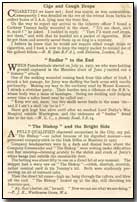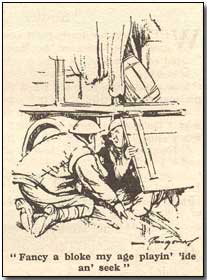Memoirs & Diaries - The Best 500 Cockney War Stories - Cigs and Cough Drops and Other Stories
 Published in London
in 1921, The Best 500 Cockney War Stories
comprised, in the words of its newspaper publisher (The London Evening
News) "a remembering and retelling of those war days when laughter
sometimes saved men's reason".
Published in London
in 1921, The Best 500 Cockney War Stories
comprised, in the words of its newspaper publisher (The London Evening
News) "a remembering and retelling of those war days when laughter
sometimes saved men's reason".
The collection of short memoirs, some 500 in total, is divided into five categories - Action, Lull, Hospital, High Seas and Here and There. This page contains five stories from Action, led by Cigs and Cough Drops.
Other sections within the collection can be accessed using the sidebar to the right.
Cigs and Cough Drops
Cigarettes we knew not; food was scarce, so was ammunition. Consequently I was detailed on the eve of the retreat from Serbia to collect boxes of S.A.A. lying near the front line.
On the way to report my arrival to the infantry officer I found a Cockney Tommy badly wounded in the chest.
"It's me chest, ain't it, mate?" he asked. I nodded in reply.
"Then I'll want corf drops, not them," and with that he handed me a packet of cigarettes. How he got them and secretly saved them up so long is a mystery.
I believe he knew that he would not require either cough drops or cigarettes, and I took a vow to keep the empty packet to remind me of the gallant fellow.
H. R. (late R.F.A.), 10th Division, London, N.3
"Smiler" to the End
When Passchendaele started on July 31, 1917, we who were holding ground captured in the Messines stunt of June 7 carried out a "dummy" attack.
One of the walking wounded coming back from this affair of bluff, I struck a hot passage, for Jerry was shelling the back areas with terrific pertinacity.
Making my way to the corduroy road by Mount Kemmel, I struck a stretcher party. Their burden was a rifleman of the R.B.'s, whose body was a mass of bandages.
Seeing me ducking and dodging every time a salvo burst near he called out:
"Keep wiv me, mate, 'cos two shells never busts in the same 'ole - and if I ain't a shell 'ole 'oo is?"
Sheer grit kept him alive until after we reached Lord Derby's War Hospital outside Warrington, and the nickname of "Smiler" fitted him to the last.
W. G. C., 2 Avonly Road, S.E.14
"The Bishop" and the Bright Side
A fully-qualified chartered accountant in the City, my pal, "The Bishop" - so called because of his dignified manner - was promoted company-clerk in the Irish Rifles at Messines in 1917.
Company headquarters were in a dark and dismal barn where the Company Commander and "The Bishop" were writing under difficulties one fine morning - listening acutely to the shriek and crash of Jerry's whizz-bangs just outside the ramshackle door.
The betting was about fifty to one on a direct hit at any moment. The skipper had a wary eye on "The Bishop" - oldish, shortish, stoutish, rather comical card in his Tommy's kit.
Both were studiously preserving an air of outward calm.
Then the direct hit came - high up, bang through the rafters, and blew off the roof.
"The Bishop" looked up at the sky, still clutching his fountain-pen.
"Ah, that's better, sir," he said. "Now we can see what we are doing."
P. J. K., Westbourne Grove, W.2
"Chuck Yer Blinkin' 'Aggis 'at 'im!"
The Cockney inhabitants of "Brick Alley," at Carnoy, on the Somme in 1916, had endured considerable attention from a German whizz-bang battery situated a mile or so away behind Trones Wood.
During a lull in the proceedings a fatigue party of "Jocks," each carrying a 40lb. sphere, the business end of a "toffee-apple" (trench mortar bomb), made their appearance, and were nicely strung out in the trench when Jerry opened out again.
The chances of a direct hit made matters doubly unpleasant.
The tension became a little too much for one of the regular billetees, and from a funk-hole in the side of the trench a reproachful voice addressed the nearest Highlander:
"For the luv o' Mike, Jock, get up and chuck yer blinkin' 'aggis at 'em."
J. C. Whiting (late 8th Royal Sussex Pioneers), 36 Hamlet Gardens, W.6
Back to Childhood
I had been given a lift in an A.S.C. lorry going to Jonchery on May 27, 1918, when it was suddenly attacked by a German plane.
On getting a burst of machine-gun bullets through the wind-screen the driver, a stout man of about forty, pulled up, and we both clambered down.
The plane came lower and re-opened fire, and as there was no other shelter we were obliged to crawl underneath the lorry and dodge from one side to the other in order to avoid the bullets.
After one hurried "pot" at the plane, and as we dived for the other side, my companion gasped: "Lumme! Fancy a bloke my age a-playin' 'ide an' seek!"
H. G. E. Woods, "The Willows," Bridge Street, Maidenhead
Next - The Altruist and four other stories
Both British and German fleets had around 45 submarines available at the time of the Battle of Jutland, but none were put to use.
- Did you know?

